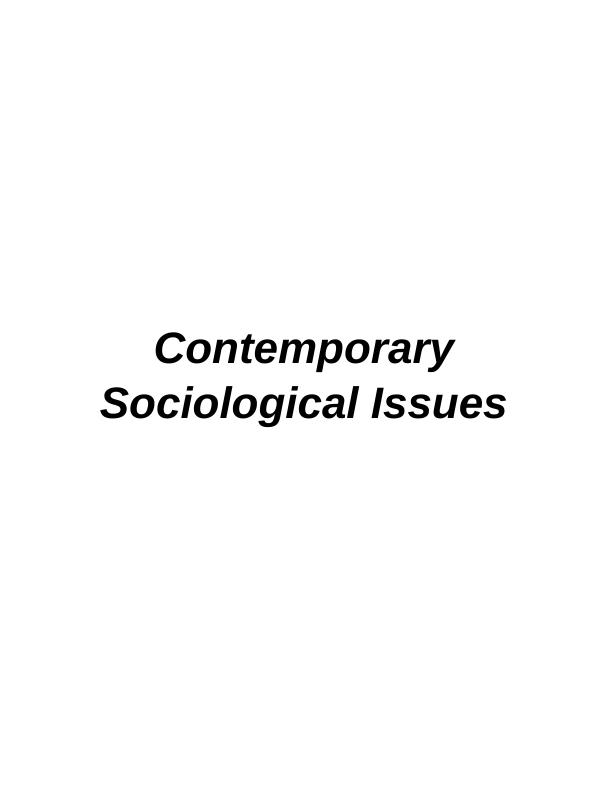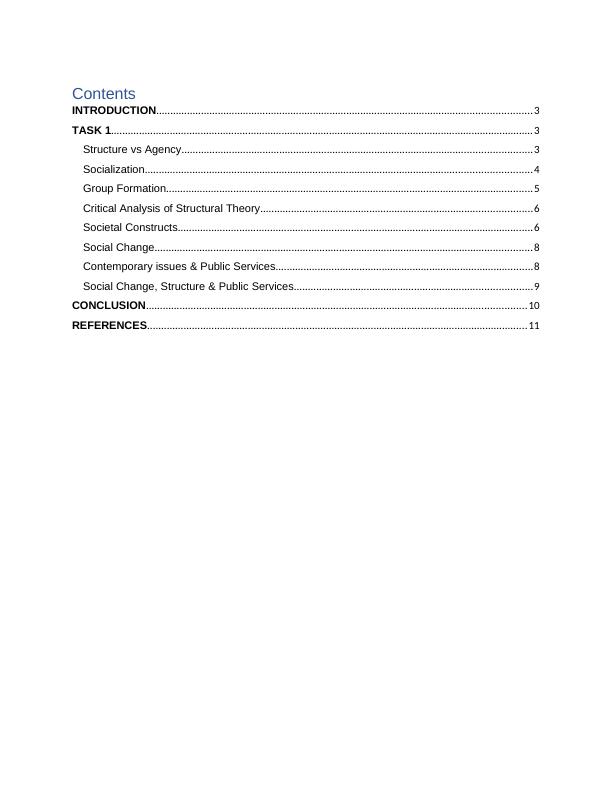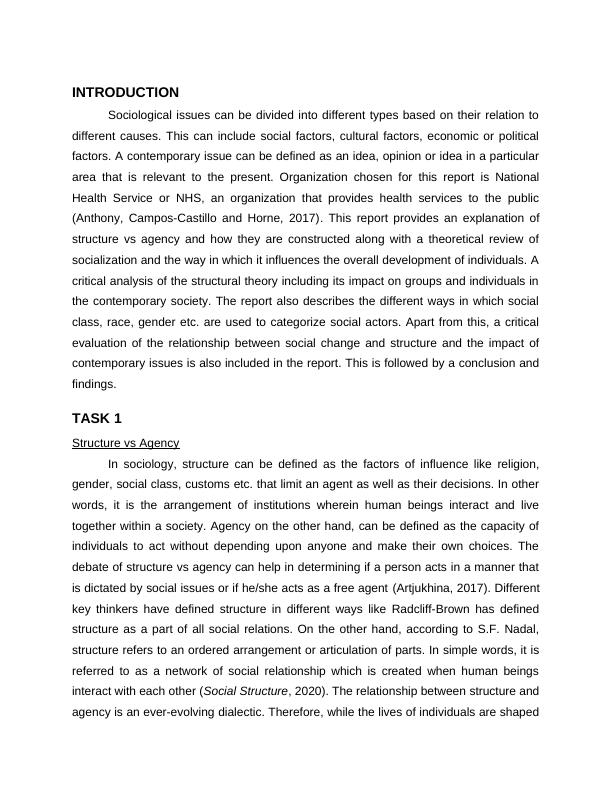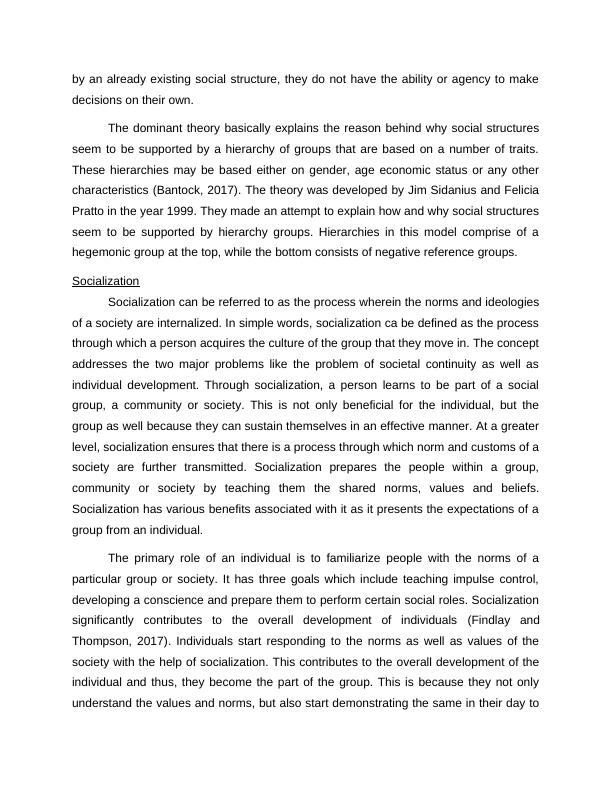Contemporary Sociological Issues
13 Pages3924 Words32 Views
Added on 2023-01-10
About This Document
This report explores contemporary sociological issues and their impact on public services, focusing on structure vs agency, socialization, group formation, and societal constructs. It also discusses the critical analysis of structural theory and the relationship between social change and structure. The report concludes with findings and recommendations.
Contemporary Sociological Issues
Added on 2023-01-10
ShareRelated Documents
Contemporary
Sociological Issues
Sociological Issues

Contents
INTRODUCTION......................................................................................................................................3
TASK 1.......................................................................................................................................................3
Structure vs Agency.............................................................................................................................3
Socialization..........................................................................................................................................4
Group Formation...................................................................................................................................5
Critical Analysis of Structural Theory.................................................................................................6
Societal Constructs...............................................................................................................................6
Social Change.......................................................................................................................................8
Contemporary issues & Public Services............................................................................................8
Social Change, Structure & Public Services.....................................................................................9
CONCLUSION........................................................................................................................................10
REFERENCES........................................................................................................................................11
INTRODUCTION......................................................................................................................................3
TASK 1.......................................................................................................................................................3
Structure vs Agency.............................................................................................................................3
Socialization..........................................................................................................................................4
Group Formation...................................................................................................................................5
Critical Analysis of Structural Theory.................................................................................................6
Societal Constructs...............................................................................................................................6
Social Change.......................................................................................................................................8
Contemporary issues & Public Services............................................................................................8
Social Change, Structure & Public Services.....................................................................................9
CONCLUSION........................................................................................................................................10
REFERENCES........................................................................................................................................11

INTRODUCTION
Sociological issues can be divided into different types based on their relation to
different causes. This can include social factors, cultural factors, economic or political
factors. A contemporary issue can be defined as an idea, opinion or idea in a particular
area that is relevant to the present. Organization chosen for this report is National
Health Service or NHS, an organization that provides health services to the public
(Anthony, Campos-Castillo and Horne, 2017). This report provides an explanation of
structure vs agency and how they are constructed along with a theoretical review of
socialization and the way in which it influences the overall development of individuals. A
critical analysis of the structural theory including its impact on groups and individuals in
the contemporary society. The report also describes the different ways in which social
class, race, gender etc. are used to categorize social actors. Apart from this, a critical
evaluation of the relationship between social change and structure and the impact of
contemporary issues is also included in the report. This is followed by a conclusion and
findings.
TASK 1
Structure vs Agency
In sociology, structure can be defined as the factors of influence like religion,
gender, social class, customs etc. that limit an agent as well as their decisions. In other
words, it is the arrangement of institutions wherein human beings interact and live
together within a society. Agency on the other hand, can be defined as the capacity of
individuals to act without depending upon anyone and make their own choices. The
debate of structure vs agency can help in determining if a person acts in a manner that
is dictated by social issues or if he/she acts as a free agent (Artjukhina, 2017). Different
key thinkers have defined structure in different ways like Radcliff-Brown has defined
structure as a part of all social relations. On the other hand, according to S.F. Nadal,
structure refers to an ordered arrangement or articulation of parts. In simple words, it is
referred to as a network of social relationship which is created when human beings
interact with each other (Social Structure, 2020). The relationship between structure and
agency is an ever-evolving dialectic. Therefore, while the lives of individuals are shaped
Sociological issues can be divided into different types based on their relation to
different causes. This can include social factors, cultural factors, economic or political
factors. A contemporary issue can be defined as an idea, opinion or idea in a particular
area that is relevant to the present. Organization chosen for this report is National
Health Service or NHS, an organization that provides health services to the public
(Anthony, Campos-Castillo and Horne, 2017). This report provides an explanation of
structure vs agency and how they are constructed along with a theoretical review of
socialization and the way in which it influences the overall development of individuals. A
critical analysis of the structural theory including its impact on groups and individuals in
the contemporary society. The report also describes the different ways in which social
class, race, gender etc. are used to categorize social actors. Apart from this, a critical
evaluation of the relationship between social change and structure and the impact of
contemporary issues is also included in the report. This is followed by a conclusion and
findings.
TASK 1
Structure vs Agency
In sociology, structure can be defined as the factors of influence like religion,
gender, social class, customs etc. that limit an agent as well as their decisions. In other
words, it is the arrangement of institutions wherein human beings interact and live
together within a society. Agency on the other hand, can be defined as the capacity of
individuals to act without depending upon anyone and make their own choices. The
debate of structure vs agency can help in determining if a person acts in a manner that
is dictated by social issues or if he/she acts as a free agent (Artjukhina, 2017). Different
key thinkers have defined structure in different ways like Radcliff-Brown has defined
structure as a part of all social relations. On the other hand, according to S.F. Nadal,
structure refers to an ordered arrangement or articulation of parts. In simple words, it is
referred to as a network of social relationship which is created when human beings
interact with each other (Social Structure, 2020). The relationship between structure and
agency is an ever-evolving dialectic. Therefore, while the lives of individuals are shaped

by an already existing social structure, they do not have the ability or agency to make
decisions on their own.
The dominant theory basically explains the reason behind why social structures
seem to be supported by a hierarchy of groups that are based on a number of traits.
These hierarchies may be based either on gender, age economic status or any other
characteristics (Bantock, 2017). The theory was developed by Jim Sidanius and Felicia
Pratto in the year 1999. They made an attempt to explain how and why social structures
seem to be supported by hierarchy groups. Hierarchies in this model comprise of a
hegemonic group at the top, while the bottom consists of negative reference groups.
Socialization
Socialization can be referred to as the process wherein the norms and ideologies
of a society are internalized. In simple words, socialization ca be defined as the process
through which a person acquires the culture of the group that they move in. The concept
addresses the two major problems like the problem of societal continuity as well as
individual development. Through socialization, a person learns to be part of a social
group, a community or society. This is not only beneficial for the individual, but the
group as well because they can sustain themselves in an effective manner. At a greater
level, socialization ensures that there is a process through which norm and customs of a
society are further transmitted. Socialization prepares the people within a group,
community or society by teaching them the shared norms, values and beliefs.
Socialization has various benefits associated with it as it presents the expectations of a
group from an individual.
The primary role of an individual is to familiarize people with the norms of a
particular group or society. It has three goals which include teaching impulse control,
developing a conscience and prepare them to perform certain social roles. Socialization
significantly contributes to the overall development of individuals (Findlay and
Thompson, 2017). Individuals start responding to the norms as well as values of the
society with the help of socialization. This contributes to the overall development of the
individual and thus, they become the part of the group. This is because they not only
understand the values and norms, but also start demonstrating the same in their day to
decisions on their own.
The dominant theory basically explains the reason behind why social structures
seem to be supported by a hierarchy of groups that are based on a number of traits.
These hierarchies may be based either on gender, age economic status or any other
characteristics (Bantock, 2017). The theory was developed by Jim Sidanius and Felicia
Pratto in the year 1999. They made an attempt to explain how and why social structures
seem to be supported by hierarchy groups. Hierarchies in this model comprise of a
hegemonic group at the top, while the bottom consists of negative reference groups.
Socialization
Socialization can be referred to as the process wherein the norms and ideologies
of a society are internalized. In simple words, socialization ca be defined as the process
through which a person acquires the culture of the group that they move in. The concept
addresses the two major problems like the problem of societal continuity as well as
individual development. Through socialization, a person learns to be part of a social
group, a community or society. This is not only beneficial for the individual, but the
group as well because they can sustain themselves in an effective manner. At a greater
level, socialization ensures that there is a process through which norm and customs of a
society are further transmitted. Socialization prepares the people within a group,
community or society by teaching them the shared norms, values and beliefs.
Socialization has various benefits associated with it as it presents the expectations of a
group from an individual.
The primary role of an individual is to familiarize people with the norms of a
particular group or society. It has three goals which include teaching impulse control,
developing a conscience and prepare them to perform certain social roles. Socialization
significantly contributes to the overall development of individuals (Findlay and
Thompson, 2017). Individuals start responding to the norms as well as values of the
society with the help of socialization. This contributes to the overall development of the
individual and thus, they become the part of the group. This is because they not only
understand the values and norms, but also start demonstrating the same in their day to

End of preview
Want to access all the pages? Upload your documents or become a member.
Related Documents
Contemporary Sociological Issueslg...
|12
|3931
|100
Contemporary Sociological Issueslg...
|12
|4464
|66
Sociological Imagination: Gender, Sexuality, and Social Inequalitylg...
|7
|1769
|396
Society and Health Assignment Solvedlg...
|6
|977
|462
Race and Ethnicity: Influence on Human Behaviorlg...
|7
|1891
|51
The Sociological Perspective vs The Anthropological Conceptualizationlg...
|8
|3734
|84
